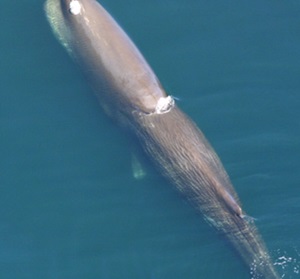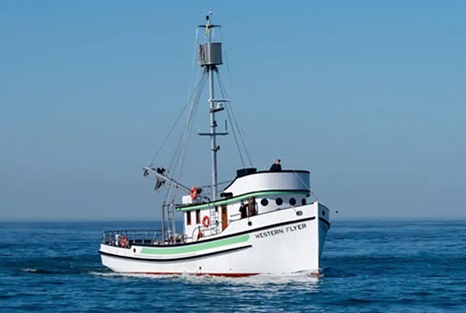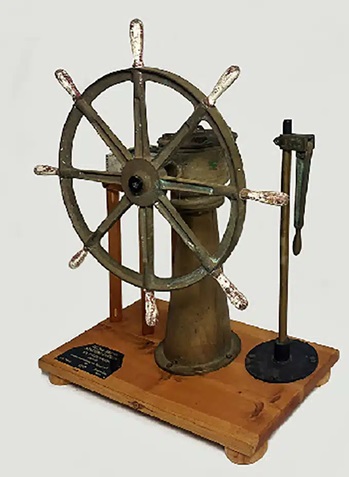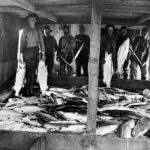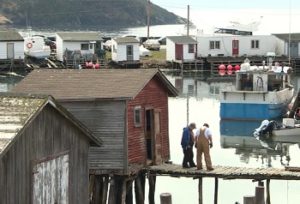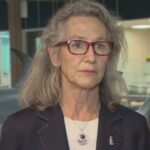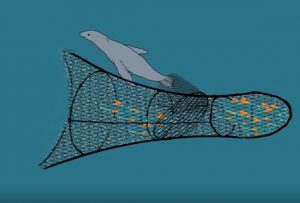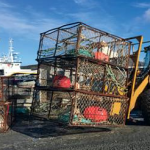Category Archives: North Pacific
How Jake Anderson Lost the F/V Saga on ‘Deadliest Catch’
 As proven in the 20 seasons of Deadliest Catch, nothing is for certain. Things can change on a whim, and security is something not to take for granted. Fan-favorite Jake Anderson has learned this the hard way. After putting everything into the F/V Saga, Jake suddenly lost control of the boat he part-owned when he was served a repossession note. With the timing coinciding with the Red King Crab fishery reopening and a derby-style race underway, Jake was essentially lost at sea. Captain Jake Anderson has been a staple on the Discovery Channel series Deadliest Catch since 2007. When he started in the industry nearly 18 years ago, he began working as a greenhorn on the F/V Northwestern. Through his time in the industry, Jake has tried his hand at every job in his career, ranging from deckhand, deck boss, engineer, captain, and vessel owner. With his focus mainly on the operations side at the helm of F/V Saga, Jake’s world was turned upside down. more, >>CLICK TO READ<< 12:18
As proven in the 20 seasons of Deadliest Catch, nothing is for certain. Things can change on a whim, and security is something not to take for granted. Fan-favorite Jake Anderson has learned this the hard way. After putting everything into the F/V Saga, Jake suddenly lost control of the boat he part-owned when he was served a repossession note. With the timing coinciding with the Red King Crab fishery reopening and a derby-style race underway, Jake was essentially lost at sea. Captain Jake Anderson has been a staple on the Discovery Channel series Deadliest Catch since 2007. When he started in the industry nearly 18 years ago, he began working as a greenhorn on the F/V Northwestern. Through his time in the industry, Jake has tried his hand at every job in his career, ranging from deckhand, deck boss, engineer, captain, and vessel owner. With his focus mainly on the operations side at the helm of F/V Saga, Jake’s world was turned upside down. more, >>CLICK TO READ<< 12:18
Commercial Fisherman/U. S. Army Veteran Jack Benton Cartwright of Oregon has passed away
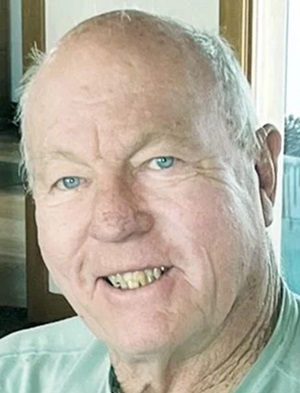 Jack Benton Cartwright was well known for his kindness and enthusiasm for life. He was a force of nature, and many have described him as “one of a kind.” Jack was born March 16, 1944, to Charlie and Okema Cartwright. He was raised on the Seaside Golf Course, which his parents owned until 1971. Jack graduated from Seaside High School in 1962, and shortly after he joined the U.S. Army. When he returned, he began logging in Alaska before starting his career as a commercial fisherman. After a few years of fishing, he and David Kelly bought the Arrow, and were exceptional halibut longliners. In 1979 he met Jane, who was working in Seward, Alaska, and was interested in fishing. In 1986, they bought an 80-foot steel boat and named it Kema Sue, in honor of his late mother and sister. Jack and Jane were married in front of family and friends, at a fun-loving celebration at Little Beach in Gearhart. more, >>CLICK TO READ<< 14:39
Jack Benton Cartwright was well known for his kindness and enthusiasm for life. He was a force of nature, and many have described him as “one of a kind.” Jack was born March 16, 1944, to Charlie and Okema Cartwright. He was raised on the Seaside Golf Course, which his parents owned until 1971. Jack graduated from Seaside High School in 1962, and shortly after he joined the U.S. Army. When he returned, he began logging in Alaska before starting his career as a commercial fisherman. After a few years of fishing, he and David Kelly bought the Arrow, and were exceptional halibut longliners. In 1979 he met Jane, who was working in Seward, Alaska, and was interested in fishing. In 1986, they bought an 80-foot steel boat and named it Kema Sue, in honor of his late mother and sister. Jack and Jane were married in front of family and friends, at a fun-loving celebration at Little Beach in Gearhart. more, >>CLICK TO READ<< 14:39
Alaska’s total commercial salmon harvest this year was ultra-low in both quantity and value
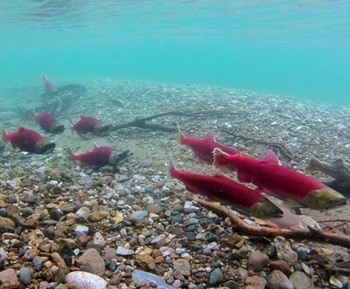 The number of Alaska salmon harvested by commercial fishers was the third smallest since all-species records began in 1985, and the value to harvesters, when adjusted for inflation, was the lowest reported since 1975, state officials said. Additionally, the 450 million pounds of salmon that the total harvest contained was the lowest on record, officials said. The totals come from a preliminary recap of this year’s salmon season issued on Nov. 18 by the Alaska Department of Fish and Game. Only 101.2 million salmon were harvested this year, less than half the 232.2 million harvested last year, the department reported. The money paid to fishers for their catches, known as ex-vessel value, totaled $304 million, down from $398 million last year, the department said, In the Bristol Bay region, site of the world’s biggest sockeye runs, this year’s return was well above projections and 7% higher than the 20-year average, though the amount commercially harvested was a bit below the average. more, >>CLICK TO READ<< 16:09
The number of Alaska salmon harvested by commercial fishers was the third smallest since all-species records began in 1985, and the value to harvesters, when adjusted for inflation, was the lowest reported since 1975, state officials said. Additionally, the 450 million pounds of salmon that the total harvest contained was the lowest on record, officials said. The totals come from a preliminary recap of this year’s salmon season issued on Nov. 18 by the Alaska Department of Fish and Game. Only 101.2 million salmon were harvested this year, less than half the 232.2 million harvested last year, the department reported. The money paid to fishers for their catches, known as ex-vessel value, totaled $304 million, down from $398 million last year, the department said, In the Bristol Bay region, site of the world’s biggest sockeye runs, this year’s return was well above projections and 7% higher than the 20-year average, though the amount commercially harvested was a bit below the average. more, >>CLICK TO READ<< 16:09
Commercial Fisherman/Vietnam Veteran Ronald Raymond Rust of Kenai, Alaska, has passed away
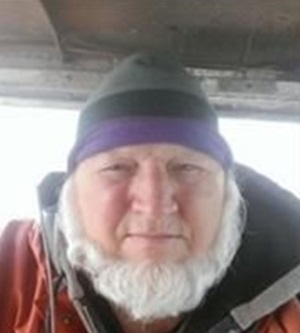 He spent his younger years living in Fairbanks. Ron and his wife Kathy moved their family to Kenai in 1981, where he lived until his passing on October 14, 2024 with his son Daniel at his side. Ron was a decorated Vietnam Veteran with an E-5 ranking in the Army. Ron was a commercial fisherman in the Cook Inlet for 59 years. His boys grew up fishing with him on his boat the “FV TIGER”. Ron also drove a school bus for over 10 years, while doing so he participated in many bus rodeos where he took championship awards for several of those years. He was an avid dart thrower. Rons greatest pleasure in his last years was to drive to the canneries and visit with his fisherman friends. and share pictures and generally sharing stories about the past with them. more, >>CLICK TO READ<< 09:25
He spent his younger years living in Fairbanks. Ron and his wife Kathy moved their family to Kenai in 1981, where he lived until his passing on October 14, 2024 with his son Daniel at his side. Ron was a decorated Vietnam Veteran with an E-5 ranking in the Army. Ron was a commercial fisherman in the Cook Inlet for 59 years. His boys grew up fishing with him on his boat the “FV TIGER”. Ron also drove a school bus for over 10 years, while doing so he participated in many bus rodeos where he took championship awards for several of those years. He was an avid dart thrower. Rons greatest pleasure in his last years was to drive to the canneries and visit with his fisherman friends. and share pictures and generally sharing stories about the past with them. more, >>CLICK TO READ<< 09:25
Dire condition of Alaska’s seafood industry has many causes and no easy fixes, experts say
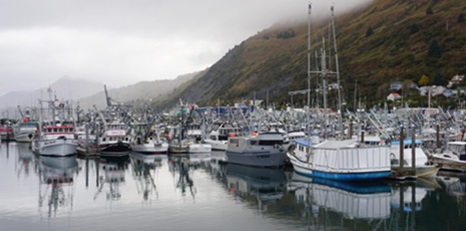 State officials and industry leaders trying to rescue the ailing Alaska seafood industry are facing daunting challenges, recently released numbers show. The industry lost $1.8 billion last year, the result of low prices, closed harvests and other problems, according to the National Oceanic and Atmospheric Administration. State Rep. Bryce Edgmon, I-Dillingham, part of a task force charged with making recommendations on ways that lawmakers can help rescue the industry, said the solutions will be difficult and will require the full attention of his colleagues next year. Joe Bundrant, chief executive officer of Trident Seafoods, described how Russian fish production is part of a “perfect storm” of low prices, devaluation of Alaska’s product and a geopolitical landscape “like I’ve never seen anything close to it.” more, >>CLICK TO READ<< 14:36
State officials and industry leaders trying to rescue the ailing Alaska seafood industry are facing daunting challenges, recently released numbers show. The industry lost $1.8 billion last year, the result of low prices, closed harvests and other problems, according to the National Oceanic and Atmospheric Administration. State Rep. Bryce Edgmon, I-Dillingham, part of a task force charged with making recommendations on ways that lawmakers can help rescue the industry, said the solutions will be difficult and will require the full attention of his colleagues next year. Joe Bundrant, chief executive officer of Trident Seafoods, described how Russian fish production is part of a “perfect storm” of low prices, devaluation of Alaska’s product and a geopolitical landscape “like I’ve never seen anything close to it.” more, >>CLICK TO READ<< 14:36
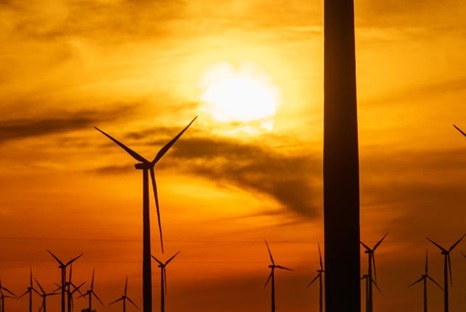
Donald Trump Pledges to Halt Big Wind Subsidies
Donald Trump’s election victory is quickly taking the wind out of the Biden administration’s ambitious renewables initiatives. President-elect Trump promised to end federal subsidies for offshore wind projects on his first day in office. As with many of his campaign pledges, Americans wait to see whether he will deliver. However, the market did not wait to see. Stock prices of offshore wind developers and turbine makers moved sharply downward following election day as investors query whether windmill projects are economically viable without the hefty federal subsidies Trump has promised to terminate. Environmental groups and fishermen have also raised concerns about the potential ecological trade-offs of this plastic-based technology and worries about ecotoxins created in the manufacturing of solar panels and EVs have caused consumers to pause. more, >>CLICK TO READ<< 10:22
Adventurer/Commercial Fisherman Carla Jean Milburn has passed away peacefully in her sleep in Homer, Ak.
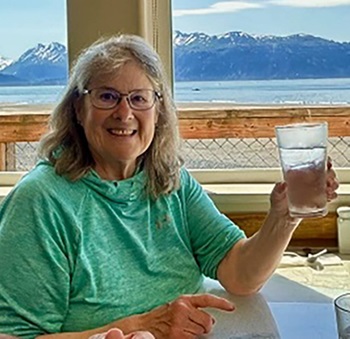 Carla Jean Milburn, born June 24, 1955, passed away peacefully in her sleep in the early morning hours of November 2, 2024 in Homer, Alaska. Born in Spokane, WA to Jeannine Fay (McLaren) Milburn and Don Devereaux Milburn, Carla attended Manson schools in Lake Chelan. After graduation in 1973 she was ready for …. adventure! Living in a fishing town Carla was lured to the water and soon took jobs on seiners and drift commercial boats in the Cook Inlet. Loving to work with fibers she then picked up the skill of mending and building nets. In short order she built a big shop on her property for fitting the long nets in. more, >>CLICK TO READ<< 09:18
Carla Jean Milburn, born June 24, 1955, passed away peacefully in her sleep in the early morning hours of November 2, 2024 in Homer, Alaska. Born in Spokane, WA to Jeannine Fay (McLaren) Milburn and Don Devereaux Milburn, Carla attended Manson schools in Lake Chelan. After graduation in 1973 she was ready for …. adventure! Living in a fishing town Carla was lured to the water and soon took jobs on seiners and drift commercial boats in the Cook Inlet. Loving to work with fibers she then picked up the skill of mending and building nets. In short order she built a big shop on her property for fitting the long nets in. more, >>CLICK TO READ<< 09:18
Federal judge dismisses Alaska trawlers’ lawsuit that sought to overturn halibut limits
 A federal judge has dismissed a lawsuit that sought to overturn new halibut bycatch limits on deep-sea trawlers that fish in federal waters off Alaska. The lawsuit was filed by Groundfish Forum Inc., a Seattle-based trawl trade group, after the North Pacific Fishery Management Council passed a rule that reduces halibut bycatch limits for many trawlers when there are fewer halibut in Alaska waters. The National Marine Fisheries Service, in charge of implementing the rule, moved to dismiss the lawsuit, and U.S. District Court Judge Sharon Gleason ruled in favor of the agency on Nov. 8. Intrafish, a trade publication, first reported on the ruling. The lawsuit has been a major issue in fishing communities across the Gulf of Alaska. Some of those communities joined the federal government in defense, as did various fishing and conservation organizations. more, >>CLICK TO READ<< 10:22
A federal judge has dismissed a lawsuit that sought to overturn new halibut bycatch limits on deep-sea trawlers that fish in federal waters off Alaska. The lawsuit was filed by Groundfish Forum Inc., a Seattle-based trawl trade group, after the North Pacific Fishery Management Council passed a rule that reduces halibut bycatch limits for many trawlers when there are fewer halibut in Alaska waters. The National Marine Fisheries Service, in charge of implementing the rule, moved to dismiss the lawsuit, and U.S. District Court Judge Sharon Gleason ruled in favor of the agency on Nov. 8. Intrafish, a trade publication, first reported on the ruling. The lawsuit has been a major issue in fishing communities across the Gulf of Alaska. Some of those communities joined the federal government in defense, as did various fishing and conservation organizations. more, >>CLICK TO READ<< 10:22
Silver Bay Seafoods acquires Peter Pan Seafoods facilities from Rodger May
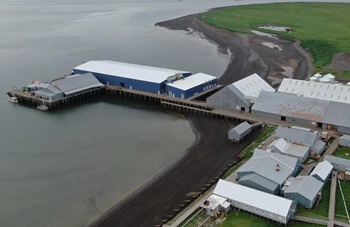 Silver Bay Seafoods will acquire processing plants in Dillingham and Port Moller, along with fishery support sites in Dillingham and North Naknek. Silver Bay announced the acquisition from Rodger May, the former co-owner of Peter Pan Seafoods, in a press release Wednesday. The Dillingham and Port Moller plants are Silver Bay’s fourth and fifth plant acquisitions this year. It also took over Peter Pan’s plant in Valdez last spring, and Trident Seafoods plants in Ketchikan and False Pass. Silver Bay said for the latest deal, both parties agreed to immediately transfer control of the facilities while the actual transfer of ownership is finalized. Silver Bay says this will “ensure a seamless transition for fisherman, communities, and employees.” more, >>CLICK TO READ<< 09:55
Silver Bay Seafoods will acquire processing plants in Dillingham and Port Moller, along with fishery support sites in Dillingham and North Naknek. Silver Bay announced the acquisition from Rodger May, the former co-owner of Peter Pan Seafoods, in a press release Wednesday. The Dillingham and Port Moller plants are Silver Bay’s fourth and fifth plant acquisitions this year. It also took over Peter Pan’s plant in Valdez last spring, and Trident Seafoods plants in Ketchikan and False Pass. Silver Bay said for the latest deal, both parties agreed to immediately transfer control of the facilities while the actual transfer of ownership is finalized. Silver Bay says this will “ensure a seamless transition for fisherman, communities, and employees.” more, >>CLICK TO READ<< 09:55
Bottom Trawl Survey of the Maine Research Array Wind Energy Area Re-Scheduled for January 13, 2025 – March 1, 2025
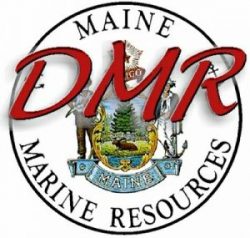 This notice is to inform you that the bottom trawl survey of the Maine Research Array Wind Energy (MeRA) Area, previously scheduled to begin on October 15, 2024, has been re-scheduled to take place between January 13, 2025 and March 1, 2025.This is a potential sampling window; the survey will be conducted during 7-10 days within this timeframe. The exact dates will be weather dependent. Operations will be conducted during daylight hours. The F/V Northern Lights (55’ trawler) will transit from Portland to the sampling area. The crew will conduct approximately 37 tows over 7-10 days of sampling. Tows will be 20 minutes and conducted at a speed of 2.5 knots. Links, more, >>CLICK TO READ<< 11:12
This notice is to inform you that the bottom trawl survey of the Maine Research Array Wind Energy (MeRA) Area, previously scheduled to begin on October 15, 2024, has been re-scheduled to take place between January 13, 2025 and March 1, 2025.This is a potential sampling window; the survey will be conducted during 7-10 days within this timeframe. The exact dates will be weather dependent. Operations will be conducted during daylight hours. The F/V Northern Lights (55’ trawler) will transit from Portland to the sampling area. The crew will conduct approximately 37 tows over 7-10 days of sampling. Tows will be 20 minutes and conducted at a speed of 2.5 knots. Links, more, >>CLICK TO READ<< 11:12
Charting a course toward seafood independence for Alaska’s vulnerable food systems
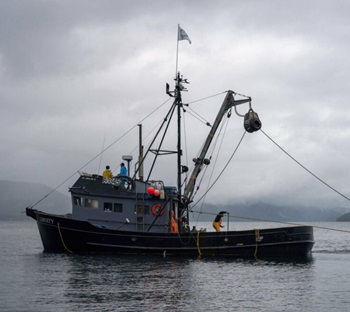 As a commercial fisherman based in Sitka and the executive director of the Alaska Longline Fishermen’s Association (ALFA), I’ve spent decades navigating Alaska’s challenging waters and the headwinds facing our fishing communities. Alaska’s coastal residents are resilient, but they are up against a new magnitude of challenges. The loss of fishing access and community-based processing capacity, along with a dearth of local markets for seafood, are straining once vibrant fishing economies up and down our coastline. I recently contributed to a fisheries access report commissioned by the Alaska Sustainable Fisheries Trust (ASFT), which highlights the outmigration of fishing access in Southeast Alaska. Communities with historically robust local fishing fleets now see few active vessels based in town. This trend is acute in communities such as Kake, which has lost its local processor — and with it, a viable market for resident fishermen. Through interviews and in-person engagement, ASFT’s report found that a common concern among fishermen was the loss of a local fish buyer. When this happens, resident fishermen often sell their permits or abandon fishing altogether. more, >>CLICK TO READ<< By Linda Behnken 12:05
As a commercial fisherman based in Sitka and the executive director of the Alaska Longline Fishermen’s Association (ALFA), I’ve spent decades navigating Alaska’s challenging waters and the headwinds facing our fishing communities. Alaska’s coastal residents are resilient, but they are up against a new magnitude of challenges. The loss of fishing access and community-based processing capacity, along with a dearth of local markets for seafood, are straining once vibrant fishing economies up and down our coastline. I recently contributed to a fisheries access report commissioned by the Alaska Sustainable Fisheries Trust (ASFT), which highlights the outmigration of fishing access in Southeast Alaska. Communities with historically robust local fishing fleets now see few active vessels based in town. This trend is acute in communities such as Kake, which has lost its local processor — and with it, a viable market for resident fishermen. Through interviews and in-person engagement, ASFT’s report found that a common concern among fishermen was the loss of a local fish buyer. When this happens, resident fishermen often sell their permits or abandon fishing altogether. more, >>CLICK TO READ<< By Linda Behnken 12:05

Trump Defeats Harris to Win a Second White House Term
Former President Donald Trump was elected the 47th president of the United States on Wednesday, mounting one of the greatest political comebacks of all time – a convicted felon who was twice impeached and left the presidency in disgrace just four years ago, only to win it back decisively in one of the most fraught elections in modern history. In defeating Vice President Kamala Harris, Trump stitched together an improbable coalition of supporters, including people of color and young voters, while promising to unfurl an America-first vision. With his victory all but assured early Wednesday morning, Trump told cheering supporters at a convention center in West Palm Beach, Florida, that “this was a movement like nobody’s ever seen before.” more, >>CLICK TO READ<< 07:41
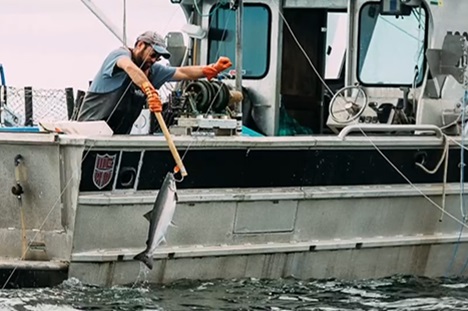
‘A friend to everybody’: Sitka man killed in bear mauling remembered by colleagues
Tad Fujioka was an avid outdoorsman whose love of fishing led him to trade the engineering field for the commercial trolling one. But Fujioka, whose body was found Wednesday north of Sitka following search and rescue efforts, the victim of a bear mauling, is being remembered less for what he did and more for the type of person he was. “I mean, everybody that knew him, liked him,” said longtime friend and colleague, Norman Pillen, president of Seafood Producers Cooperative (SPC) in Sitka. Fujioka was the board chair for SPC and a big advocate for the commercial fishing industry. He was a strong family man and man of many talents, Pillen said. Video, more, >>CLICK TO READ<< 08:04
A major fisheries advocate, Sitkan Tad Fujioka found dead in apparent bear mauling
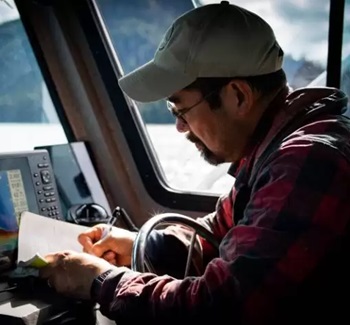 The call that Tad Fujioka was overdue could not have come at a worse time. On the evening of October 29, Sitka and the outer coast of Southeast were being lashed by a windstorm, with some gusts in excess of 50 miles per hour. Fire Chief Craig Warren says Air Station Sitka launched a helicopter, nevertheless, equipped with Forward-Looking-Infrared (FLIR), to search an area about ten miles north of Sitka in Nakwasina Sound. Fujioka was believed to be returning to an area where he had shot a deer on Monday in much better weather and had cached part of the carcass. The shock reverberated quickly around Sitka. Norm Pillen is the President of Seafood Producers Cooperative, where Fujioka was board chair. more, >>CLICK TO READ<< 11:47
The call that Tad Fujioka was overdue could not have come at a worse time. On the evening of October 29, Sitka and the outer coast of Southeast were being lashed by a windstorm, with some gusts in excess of 50 miles per hour. Fire Chief Craig Warren says Air Station Sitka launched a helicopter, nevertheless, equipped with Forward-Looking-Infrared (FLIR), to search an area about ten miles north of Sitka in Nakwasina Sound. Fujioka was believed to be returning to an area where he had shot a deer on Monday in much better weather and had cached part of the carcass. The shock reverberated quickly around Sitka. Norm Pillen is the President of Seafood Producers Cooperative, where Fujioka was board chair. more, >>CLICK TO READ<< 11:47
Pollock trawl closure sends economic ripples across Kodiak as fishermen adapt
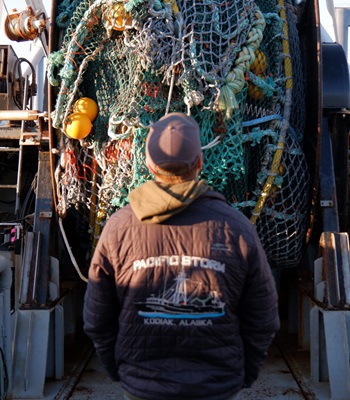 Cole Hockema has been fishing since he was a teenager growing up in Oregon. Hockema captains the F/V Pacific Storm, a 100-foot trawler based out of Kodiak, which his father owns. The vast majority of the Central Gulf of Alaska trawl fleet is made up of local boats like his. According to the trade group Alaska Groundfish Data Bank, 19 boats were fishing in the Central Gulf of Alaska when the pollock fishery closed on Sept. 25. 15 of those are homeported in Kodiak. Normally, fishermen like Hockema would be out on the water until early November, when the Gulf of Alaska’s pollock B season typically closes. But this fall season ended just three weeks into fishing, when two vessels incidentally hauled in approximately 2,000 Chinook salmon, which exceeded the fishery’s annual bycatch limit. Hockema said the Pacific Storm was offloading its catch on Sunday, Sept. 22 when they first got the news about the bycatch and he knew the fleet would need to stop fishing immediately. more, >>CLICK TO READ<< 16:27
Cole Hockema has been fishing since he was a teenager growing up in Oregon. Hockema captains the F/V Pacific Storm, a 100-foot trawler based out of Kodiak, which his father owns. The vast majority of the Central Gulf of Alaska trawl fleet is made up of local boats like his. According to the trade group Alaska Groundfish Data Bank, 19 boats were fishing in the Central Gulf of Alaska when the pollock fishery closed on Sept. 25. 15 of those are homeported in Kodiak. Normally, fishermen like Hockema would be out on the water until early November, when the Gulf of Alaska’s pollock B season typically closes. But this fall season ended just three weeks into fishing, when two vessels incidentally hauled in approximately 2,000 Chinook salmon, which exceeded the fishery’s annual bycatch limit. Hockema said the Pacific Storm was offloading its catch on Sunday, Sept. 22 when they first got the news about the bycatch and he knew the fleet would need to stop fishing immediately. more, >>CLICK TO READ<< 16:27
Lifelong Commercial Fisherman Army Veteran Theodore “Ted” Reed Merrell III, of Juneau, has passed away
 Theodore “Ted” Reed Merrell III, 76, died at his Fritz Cove home on October 16, 2024 after a long struggle with Progressive Supranuc Palsy (PSP). Ted and Lucy were engaged while Ted was on R&R in Hawaii and after discharge, they were married in Minnesota. They headed to Juneau as soon as Lucy graduated, driving Ted’s hot orange 1970 stick-shift Dodge Charger R/T. Ted soon got his own boat–an open 19-footer –and began a lifelong career in commercial fishing. Other boats followed: Diamondtooth (an ancient wooden gillnetter), Onni (a fast bowpicker with troublesome twin Volvo engines), Invictus, and for most of his career, the 45-foot Dundas. Ted had permits in many fisheries and tried crab, herring, and salmon gillnetting and finally settled into longlining and trolling, often accompanied by his son, Nelson. He fished all over the Northern Panhandle and especially liked downtime with friends in the fishing village, Elfin Cove. more, >>CLICK TO READ<< 15:44
Theodore “Ted” Reed Merrell III, 76, died at his Fritz Cove home on October 16, 2024 after a long struggle with Progressive Supranuc Palsy (PSP). Ted and Lucy were engaged while Ted was on R&R in Hawaii and after discharge, they were married in Minnesota. They headed to Juneau as soon as Lucy graduated, driving Ted’s hot orange 1970 stick-shift Dodge Charger R/T. Ted soon got his own boat–an open 19-footer –and began a lifelong career in commercial fishing. Other boats followed: Diamondtooth (an ancient wooden gillnetter), Onni (a fast bowpicker with troublesome twin Volvo engines), Invictus, and for most of his career, the 45-foot Dundas. Ted had permits in many fisheries and tried crab, herring, and salmon gillnetting and finally settled into longlining and trolling, often accompanied by his son, Nelson. He fished all over the Northern Panhandle and especially liked downtime with friends in the fishing village, Elfin Cove. more, >>CLICK TO READ<< 15:44
The 10 Wildest ‘Deadliest Catch’ Moments, Ranked
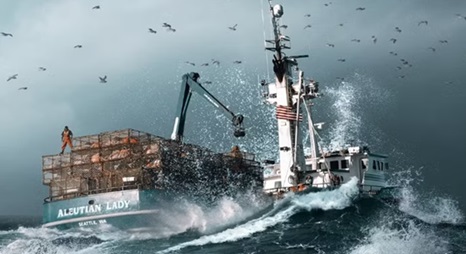 Since its premiere in 2005, Deadliest Catch has thrilled audiences by pulling back the curtain on the perilous world of Alaskan crab fishing. The icy waters, unpredictable weather, and extreme physical demands show how the Bering Sea can be one of the most dangerous workplaces in the world. The grueling nature of the show, therefore, has produced some of the wildest moments ever caught on camera over the years. Episodes featuring deadly waves, boat fires, and catastrophic sinkings like that of one of the F/V Destination serve as grim reminders of what working at the sea can be like! more, >>CLICK TO READ<< 10:04
Since its premiere in 2005, Deadliest Catch has thrilled audiences by pulling back the curtain on the perilous world of Alaskan crab fishing. The icy waters, unpredictable weather, and extreme physical demands show how the Bering Sea can be one of the most dangerous workplaces in the world. The grueling nature of the show, therefore, has produced some of the wildest moments ever caught on camera over the years. Episodes featuring deadly waves, boat fires, and catastrophic sinkings like that of one of the F/V Destination serve as grim reminders of what working at the sea can be like! more, >>CLICK TO READ<< 10:04
Red king crab harvest looking ‘very good’ so far for Bristol Bay fleet
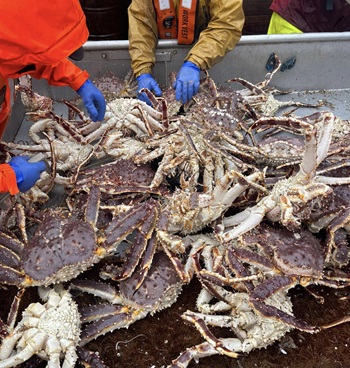 The Bering Sea’s biggest and most lucrative crab fisheries opened last week, and so far, fishing is looking good. “Fishing has been very good for the [Bristol Bay red king crab] fleet this season and the crab delivered so far has been of high quality — new shell, large size, good meat-fill,” said Alaska Department of Fish and Game Area Management Biologist Ethan Nichols. As of Wednesday afternoon, about 29% of the total allowable catch (TAC), for the Bristol Bay red king crab fishery had been harvested, according to Nichols. He said so far, reports from captains and from observer catch reports show signs of productive fishing. Nichols said 14 vessels had landed about 680,000 pounds of king crab. The average weight is 6.84 pounds, and the catch rate is 35 legal males per pot. Both of those numbers are up slightly from last year. more, >>CLICK TO READ<< 09:14
The Bering Sea’s biggest and most lucrative crab fisheries opened last week, and so far, fishing is looking good. “Fishing has been very good for the [Bristol Bay red king crab] fleet this season and the crab delivered so far has been of high quality — new shell, large size, good meat-fill,” said Alaska Department of Fish and Game Area Management Biologist Ethan Nichols. As of Wednesday afternoon, about 29% of the total allowable catch (TAC), for the Bristol Bay red king crab fishery had been harvested, according to Nichols. He said so far, reports from captains and from observer catch reports show signs of productive fishing. Nichols said 14 vessels had landed about 680,000 pounds of king crab. The average weight is 6.84 pounds, and the catch rate is 35 legal males per pot. Both of those numbers are up slightly from last year. more, >>CLICK TO READ<< 09:14
For more than a century, a fish plant fueled King Cove’s economy. Without it, can the community survive?
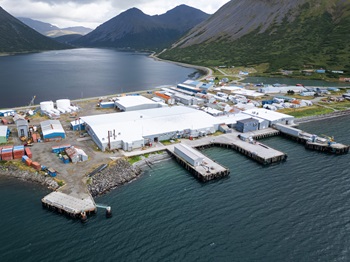 Five months ago, King Cove Mayor Warren Wilson wrote an opinion piece in the Anchorage Daily News. The headline was stark: Fighting For Our Lives in King Cove. Peter Pan Seafood Co., the owner of a plant that had served as the economic engine of the Southwest Alaska town of about 800 for more than a century, had just announced it would cease operations. “As King Cove’s mayor,” he wrote at the time, “it hurts my heart to say that it has taken only a few short months for me to no longer recognize my world. Events have conspired to threaten our very existence.” The seafood industry around the world has been devastated by low fish prices, high interest rates, oversupply in some markets and poor fish returns in others. In Alaska, according to a recent report from NOAA Fisheries, profits fell by half between 2021 and 2023. Few Alaska communities have felt the pain of the seafood industry crisis more than King Cove. With the plant’s owner out of business, residents are left to wonder if their community has a future. more, >>CLICK TO READ<< 09:43
Five months ago, King Cove Mayor Warren Wilson wrote an opinion piece in the Anchorage Daily News. The headline was stark: Fighting For Our Lives in King Cove. Peter Pan Seafood Co., the owner of a plant that had served as the economic engine of the Southwest Alaska town of about 800 for more than a century, had just announced it would cease operations. “As King Cove’s mayor,” he wrote at the time, “it hurts my heart to say that it has taken only a few short months for me to no longer recognize my world. Events have conspired to threaten our very existence.” The seafood industry around the world has been devastated by low fish prices, high interest rates, oversupply in some markets and poor fish returns in others. In Alaska, according to a recent report from NOAA Fisheries, profits fell by half between 2021 and 2023. Few Alaska communities have felt the pain of the seafood industry crisis more than King Cove. With the plant’s owner out of business, residents are left to wonder if their community has a future. more, >>CLICK TO READ<< 09:43
Commercial salmon fishers struggle with low prices
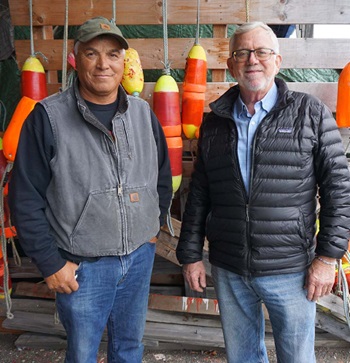 With the commercial salmon season coming to an end, 2024 is shaping up to be a lean year for commercial salmon fishers up and down the West Coast. That’s largely because prices for salmon that fishers receive at the dock are at an unusual low. Warren “Buck” Gibbons lives in Bellingham and has been fishing for sockeye in Bristol Bay, Alaska, since 1976. In a good year, Gibbons said, a Bristol Bay sockeye fisher can gross $300,000–400,000 (they take home less after expenses). But when prices are as low as they were this summer, they’ll gross about $100,000 (again, the take-home pay is less). For a fisher working on a smaller scale, including many tribal fishers, the situation is even grimmer. Dana Wilson of the Lummi Nation said that with prices so low, it hasn’t been worth selling salmon for the last couple years. He now keeps his entire catch to feed his own family and relies mostly on crab for income. more, >>CLICK TO READ<< 13:25
With the commercial salmon season coming to an end, 2024 is shaping up to be a lean year for commercial salmon fishers up and down the West Coast. That’s largely because prices for salmon that fishers receive at the dock are at an unusual low. Warren “Buck” Gibbons lives in Bellingham and has been fishing for sockeye in Bristol Bay, Alaska, since 1976. In a good year, Gibbons said, a Bristol Bay sockeye fisher can gross $300,000–400,000 (they take home less after expenses). But when prices are as low as they were this summer, they’ll gross about $100,000 (again, the take-home pay is less). For a fisher working on a smaller scale, including many tribal fishers, the situation is even grimmer. Dana Wilson of the Lummi Nation said that with prices so low, it hasn’t been worth selling salmon for the last couple years. He now keeps his entire catch to feed his own family and relies mostly on crab for income. more, >>CLICK TO READ<< 13:25
Bering Sea snow crab fishing to resume, but at an ultra-low level to encourage repopulation
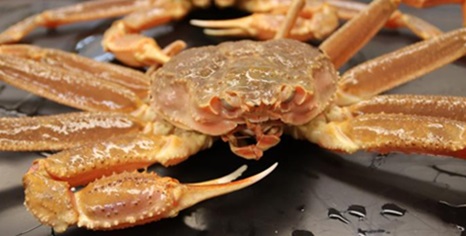 After a two-year hiatus forced by low stocks, the Bering Sea snow crab harvest is back on. The decision to reopen the harvest, announced on Oct. 4 by the Alaska Department of Fish and Game, is based on signs of recovery in the crab populations. The official harvest opening was Tuesday. Signs of recovery are modest, and so is the allowable catch. The harvest is limited to 4.72 million pounds, a level that is a far cry from the 45-million-pound quota used in the 2020-21 season and similarly large quotas in earlier years. This season’s total allowable catch is the smallest in the history of the fishery, said Mark Stichert, the Alaska Department of Fish and Game’s Kodiak-based management coordinator for groundfish and shellfish harvests. more, >>CLICK TO READ<< 19:40
After a two-year hiatus forced by low stocks, the Bering Sea snow crab harvest is back on. The decision to reopen the harvest, announced on Oct. 4 by the Alaska Department of Fish and Game, is based on signs of recovery in the crab populations. The official harvest opening was Tuesday. Signs of recovery are modest, and so is the allowable catch. The harvest is limited to 4.72 million pounds, a level that is a far cry from the 45-million-pound quota used in the 2020-21 season and similarly large quotas in earlier years. This season’s total allowable catch is the smallest in the history of the fishery, said Mark Stichert, the Alaska Department of Fish and Game’s Kodiak-based management coordinator for groundfish and shellfish harvests. more, >>CLICK TO READ<< 19:40
Alaska’s “Imploding” Fishing Industry Has Shed 38,000 Jobs
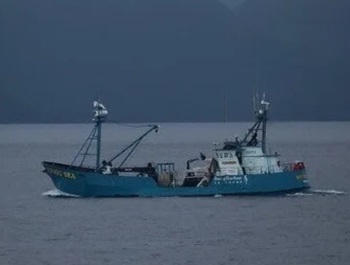 In an economic review requested by fishermen and processors, NOAA found that profitability dropped by half from 2021-23, and wholesale prices dropped by a quarter in 2022-23. This left the Alaskan seafood industry with a total direct loss of $1.8 billion in 2022-3 and the loss of about 38,000 jobs. “For many Alaskans the decline of their seafood industry affects their pocketbooks, presents food security concerns, and impacts their way of life, sense of place, community, and identity,” NOAA noted. “In the face of evolving climate-driven impacts to ecosystems and fisheries in the region, these recent market disruptions undermine the capacity of all segments of the seafood industry and associated fishing communities to be resilient and survive in fisheries.” more, >>CLICK TO READ<< 11:47
In an economic review requested by fishermen and processors, NOAA found that profitability dropped by half from 2021-23, and wholesale prices dropped by a quarter in 2022-23. This left the Alaskan seafood industry with a total direct loss of $1.8 billion in 2022-3 and the loss of about 38,000 jobs. “For many Alaskans the decline of their seafood industry affects their pocketbooks, presents food security concerns, and impacts their way of life, sense of place, community, and identity,” NOAA noted. “In the face of evolving climate-driven impacts to ecosystems and fisheries in the region, these recent market disruptions undermine the capacity of all segments of the seafood industry and associated fishing communities to be resilient and survive in fisheries.” more, >>CLICK TO READ<< 11:47
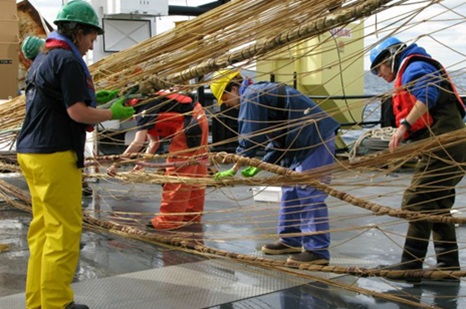
Multiple groups urge seafloor protections from pelagic trawling
A diverse group of harvesters, conservation entities and others are calling on federal fisheries managers to do more to protect seafloor habitats from midwater trawl nets they say are dragging the bottom of the ocean floor. Midwater, or pelagic trawling — used to catch schooling fish like pollock, is supposed to be fished in the water column rather than on the seafloor. For this reason, pelagic trawling is allowed in most conservation areas closed to bottom trawling — a form of fishing where nets are purposely dragged on the seafloor and damage corals, sponges and other living seafloor habitats in the process. An analysis by the National Marine Fisheries Service indicates that 40% to 100% of the width of pelagic trawl gear fished in the Gulf of Alaska and Bering Sea has been in contact with the seafloor, and that these nets, which range from 50 to 190 yards wide, are dragged for miles. more, >>CLICK TO READ<< 20:12
Trident to sell Kodiak plant to Pacific Seafood
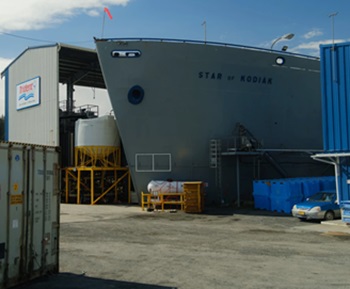 Kodiak’s largest seafood processing plant has a new owner. Trident Seafoods announced on Oct. 14 that it reached a deal with Pacific Seafood for the downtown facility. The Star of Kodiak plant in its namesake town is the last plant to sell after Trident, which is based in Seattle, announced a major restructuring plan back in December 2023, which included selling four plants in Alaska – a third of the company’s facilities in the state. Trident noted the tough state of the seafood industry for its decision – a market collapse detailed by a recent “economic snapshot” from the National Oceanic and Atmospheric Administration, which found that Alaska’s seafood industry was worth $1.8 billion less in 2023 than it was in 2022. Links, more, >>CLICK TO READ<< 09:39
Kodiak’s largest seafood processing plant has a new owner. Trident Seafoods announced on Oct. 14 that it reached a deal with Pacific Seafood for the downtown facility. The Star of Kodiak plant in its namesake town is the last plant to sell after Trident, which is based in Seattle, announced a major restructuring plan back in December 2023, which included selling four plants in Alaska – a third of the company’s facilities in the state. Trident noted the tough state of the seafood industry for its decision – a market collapse detailed by a recent “economic snapshot” from the National Oceanic and Atmospheric Administration, which found that Alaska’s seafood industry was worth $1.8 billion less in 2023 than it was in 2022. Links, more, >>CLICK TO READ<< 09:39
After tough salmon season, Lower Cook Inlet fishermen say it will be a struggle to stay afloat
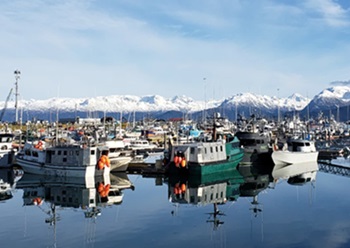 Alaska’s salmon season is largely over. However, commercial fishermen on the southern Kenai Peninsula are reflecting on a year marked by declining catches and higher costs. That includes first-year tender captain Theodore “Teddy” Handley, who took on the role of running his own vessel, the Julia Starr, this season. As a tender captain, he collects fish from fishing boats and delivers them to processing plants. Handley said the sheer pink salmon volume typically boosts the late-season harvest “Even though you’re paid maybe a sixth of what you get for sockeyes per pound, just the volume more that shows up in a pink run is how a lot of the fishermen make their money, and that’s how a lot of the canneries make their money too,” Handley said. Homer’s fishing community comprises generations of families who harvest salmon, halibut and other species from the waters of Lower Cook Inlet. The city is also made up of people and businesses that rely on the commercial fishing industry for income. more, >>CLICK TO READ<< 17:40
Alaska’s salmon season is largely over. However, commercial fishermen on the southern Kenai Peninsula are reflecting on a year marked by declining catches and higher costs. That includes first-year tender captain Theodore “Teddy” Handley, who took on the role of running his own vessel, the Julia Starr, this season. As a tender captain, he collects fish from fishing boats and delivers them to processing plants. Handley said the sheer pink salmon volume typically boosts the late-season harvest “Even though you’re paid maybe a sixth of what you get for sockeyes per pound, just the volume more that shows up in a pink run is how a lot of the fishermen make their money, and that’s how a lot of the canneries make their money too,” Handley said. Homer’s fishing community comprises generations of families who harvest salmon, halibut and other species from the waters of Lower Cook Inlet. The city is also made up of people and businesses that rely on the commercial fishing industry for income. more, >>CLICK TO READ<< 17:40
Alaska’s seafood industry lost $1.8 billion last year, NOAA report says
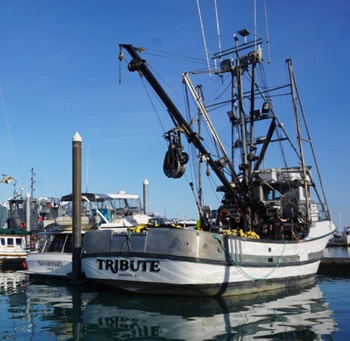 A variety of market forces combined with fishery collapses occurring in a rapidly changing environment caused Alaska’s seafood industry to lose $1.8 billion from 2022 to 2023, a new federal report said. The array of economic and environmental challenges has devastated one of Alaska’s main industries, said the report, issued by the National Oceanic and Atmospheric Administration. And the losses extend beyond economics, casting doubt on prospects for the future, the report said. The losses also extend beyond Alaska. Nationwide, Alaska’s seafood industry woes caused the loss from 2022 to 2023 of more than 38,000 jobs and a $4.3 billion decline in total U.S. output, the report said. There was also a loss of $269 million in combined state and local tax revenues, the report said. The states most affected beyond Alaska were those on the West Coast. The report breaks down the dollar losses. more, >>CLICK TO READ<< 10:14
A variety of market forces combined with fishery collapses occurring in a rapidly changing environment caused Alaska’s seafood industry to lose $1.8 billion from 2022 to 2023, a new federal report said. The array of economic and environmental challenges has devastated one of Alaska’s main industries, said the report, issued by the National Oceanic and Atmospheric Administration. And the losses extend beyond economics, casting doubt on prospects for the future, the report said. The losses also extend beyond Alaska. Nationwide, Alaska’s seafood industry woes caused the loss from 2022 to 2023 of more than 38,000 jobs and a $4.3 billion decline in total U.S. output, the report said. There was also a loss of $269 million in combined state and local tax revenues, the report said. The states most affected beyond Alaska were those on the West Coast. The report breaks down the dollar losses. more, >>CLICK TO READ<< 10:14
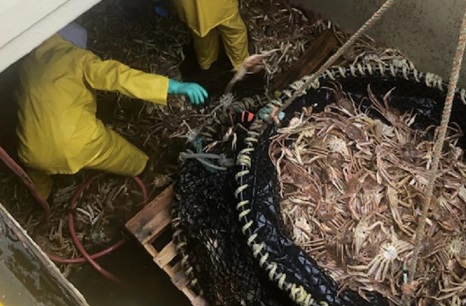
In surprising move, Bering Sea snow crab fishery to reopen after 2 year closure
The Alaska Department of Fish and Game announced Friday afternoon that Bering Sea fishermen will be allowed to harvest a total of about 4.7 million pounds of opilio, also known as snow crab, for the first time in two years. According to Fish and Game, estimates of total mature male biomass are above the threshold required to open the fishery. The announcement comes as a surprise to many fishermen, after roughly 10 billion snow crabs disappeared from the Bering Sea over a span of four years, and Fish and Game closed the fishery in 2022. Recently, scientists have learned that the disappearance was likely due to ecological shifts, and there’s been little hope within the industry that stocks would recover anytime soon. more, >>CLICK TO READ<< 10:49
Who is Keith Colburn? All About ‘Deadliest Catch’ Reality Star
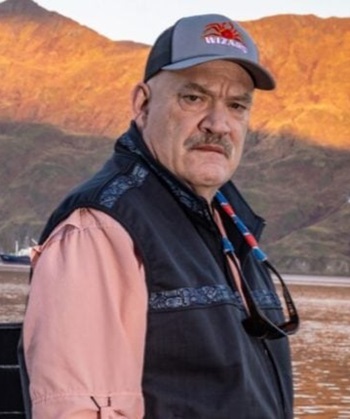 American businessman, fisherman, and reality TV personality Keith Colburn is most recognized for his work on the Discovery Channel series Deadliest Catch. Colburn’s exciting life at sea has brought him success and notoriety as the owner and captain of the FV Wizard. His rise from a commercial crab fisherman to a television celebrity is a credit to his perseverance and hard work. Keith Colburn began his career as a commercial fisherman, eventually becoming the captain and owner of FV Wizard. His ascent to fame started when he appeared on Deadliest Catch, which exposed viewers to the hazardous and taxing world of Alaskan crab fishing. Keith has established himself as a prominent figure in reality television. He has contributed as a consultant on numerous Deadliest Catch TV specials and series over the years. more, >>CLICK TO RED<< 11:46
American businessman, fisherman, and reality TV personality Keith Colburn is most recognized for his work on the Discovery Channel series Deadliest Catch. Colburn’s exciting life at sea has brought him success and notoriety as the owner and captain of the FV Wizard. His rise from a commercial crab fisherman to a television celebrity is a credit to his perseverance and hard work. Keith Colburn began his career as a commercial fisherman, eventually becoming the captain and owner of FV Wizard. His ascent to fame started when he appeared on Deadliest Catch, which exposed viewers to the hazardous and taxing world of Alaskan crab fishing. Keith has established himself as a prominent figure in reality television. He has contributed as a consultant on numerous Deadliest Catch TV specials and series over the years. more, >>CLICK TO RED<< 11:46






